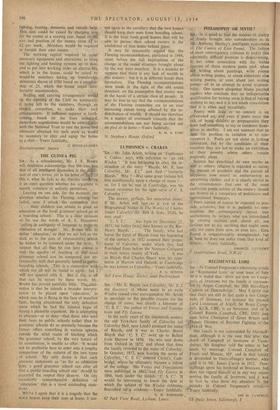s firmly brought into 'consideration as in Mt. Anthony Hartley's
intelligent assessment of The Cantos of Ezra Pound. The failure of most contemporary criticism to tackle this admittedly difficult' problem is disheartening. It has some connection with the feeble f enzies of those modern poets wile. when writing about paintings, write poems agaut writing poems, or about somebody else writing poems, or even about not writing poems—all in an attempt to avoid responsi- bility. One cannot altogether blame puzzled readers who conclude that an indispensable qualification for writing verse is that.of having nothing to say, and it is not much consolation that it is often said beautifully.
Poetry with little or no content is •an eviscerated art, and even if poets incur the risk of being didktic or propagandist they must find something to say or condemn them- selves to sterility. I am not unaware that to state the problem in isolation is to mis- represent it. Poets arc not alone in lacking conviction, .but by the conditiOns of their vocation they are led to make an exhibition of • their poverty where others remain prudently silent,
'Science has punctured its• own myths as 411 as others; religion is regarded as nafvel ihs pursuit of goodness and the pursuit of Aspiness now sound as embarrassing as advertising clichds: and it is clearly pitiful in the circumstances that one of the most exuberant poetic talents of the century should see history as a conspiracy of 'politicians and international financiers.
1, Poets cannot of course be expected to pro- vide solutions, but it is pathetic to con- template the contemporary retreat into aestheticism by writers who are intimidated Or existing realities and, above all. are anxious not to say anything that might seem silly ten years from now, or even less. Ezra Pound is unquestionably wrongheaded. but ill, least he does not suffer from that kind of timidity.--Yours faithfully, EMANUEL, 1 n viNoEP 7 Sandringham Road, N.W.11


































 Previous page
Previous page